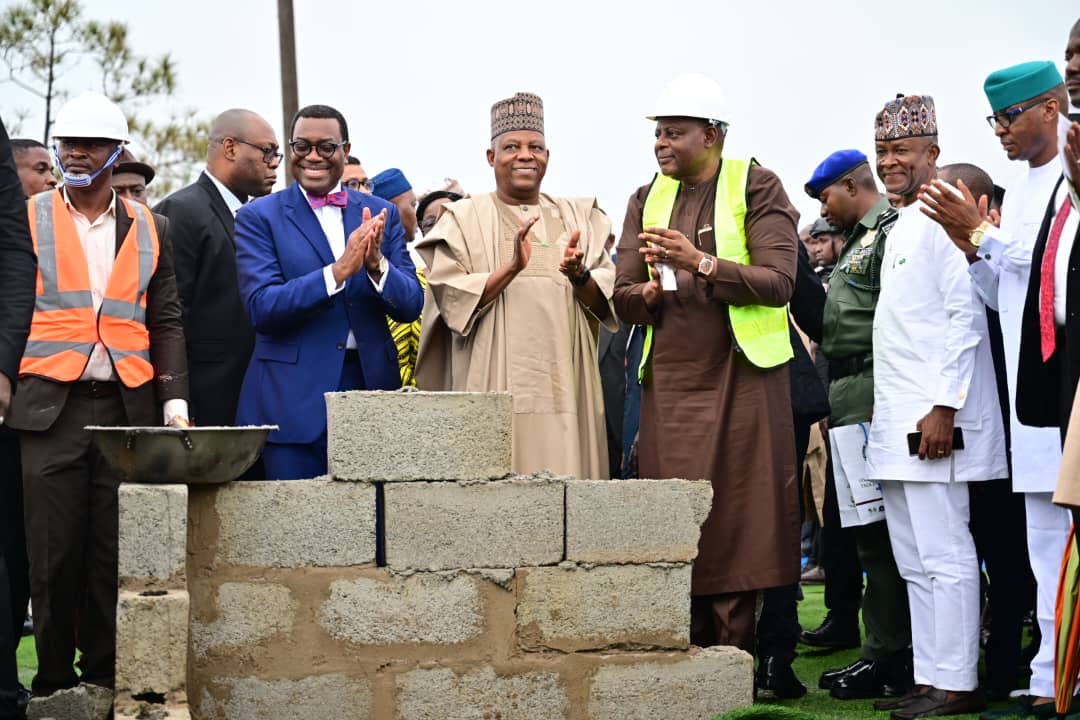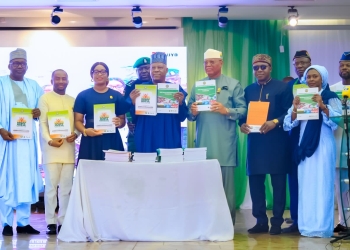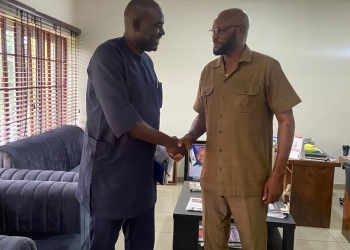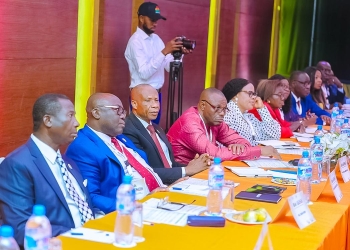L-R: Dr. Akinwumi Adesina, President of AfDB, Senator Kashim Shettima, the Vice President of Nigeria, Senator Prince Bassey Otu, the Gov. of CRS, Senator John Owan-Enoh the Minister of State for Industries, Trade and Commerce and Rt. Hon. Peter Odey, the Deputy Governor, CRS at the flag off.
By Anietie Akpan
Vice President Kashim Shettima, on Thursday, April 10, flagged off the Special Agro-Industrial Processing Zone (SAPZ) in Calabar, Cross River State, saying “it’s a game changer”.
Just as the African Development Bank (AfDP) is planning to increase the SAPZ from current eight to 28 more states in the country with a $2.2 billion investment.
The groundbreaking ceremony of the SAPZ in the state marked a pivotal moment in the country’s agricultural and economic transformation and it is seen as a major step towards realizing President Bola Tinubu’s vision for a prosperous Nigeria under the Renewed Hope Agenda.
This was contained in a press release endorsed by the Chief Press Secretary to the Governor of Cross River State, Nsa Gill.
Shettima, who was assisted by Governor Bassey Otu, the AfDB President, Akinwumi Adesina, and other key stakeholders at the official launch of the project; described the SAPZ initiative as “a game-changer that aligns with the country’s aspirations for economic growth, job creation, and food security”.
He commended the collaboration among the AfDB, Islamic Development Bank, IFAD, and the Cross River State Government, noting their collective efforts in bringing the project to fruition.
Located along Tinapa road, Adiabo in the outskirts of Calabar, the Vice President emphasized that the SAPZ would serve as an important “catalyst for national development, particularly in addressing food security challenges and fostering sustainable agricultural growth across the country”.
Governor Bassey Otu echoed Vice President Shettima’s sentiments, emphasizing that the SAPZ project perfectly fits his prosperity agenda, expressing confidence in its success and at the same time assuring stakeholders that it will benefit agricultural regions in Cross River—including Ikom, Yala, Obanliku, Obubra, and others—by transforming them into key hubs for agricultural productivity and industrial growth.
Governor Otu further highlighted that the project is not just about the present but is “designed for long-term prosperity, creating new pathways for growth and economic diversification across the state” and pledged the full commitment of his administration in ensuring its success, stating that it would “provide lasting benefits for the people of Cross River”.
The Governor also spoke of the strategic location of the Agro-Industrial Hub, which spans 130 hectares and boasts critical infrastructure like the Calabar Seaport, Bakassi Deep Seaport, and a 23MW power plant in Tinapa, alongside the larger 630MW Calabar Power Plant located 20 km away.
He added that the site would benefit from proposed rail links connecting 14 local government areas, including those near the Agricultural Transformation Centre in Yala, as well as the proximity to the Calabar River and an international airport—ensuring global market access for the state’s agro-industrial products.
Governor Otu stated that the SAPZ project aligns with his administration’s focus on food security, energy sufficiency, and job creation.
On his part, AfDB President Akinwumi Adesina passionately addressed the gathering, praising Governor Otu’s leadership and commitment to transforming Cross River’s agricultural landscape.
Adesina expressed his pride in seeing the SAPZ vision come to life after years of challenges in implementation and emphasized the economic potential of SAPZs, particularly in creating jobs, reducing food imports, and fostering private investments.
Adesina also highlighted Nigeria’s vast agricultural potential, urging for a united effort to achieve food self-sufficiency and leadership in agricultural exports.
He credited the strong political will from President Tinubu, the unwavering support from Vice President Shettima, and the collaboration between key ministers as vital factors driving the success of the SAPZ initiative.
“This project is set to have a significant transformational impact, particularly in rural areas, with potential for job creation and economic revitalization through the development of modern agro-industrial hubs.
So far, he said, “$934 million has been invested into SAPZs across 11 African countries, with Nigeria’s first phase covering eight states, including Cross River and a second phase, aimed at expanding to 28 states, will see an estimated investment of $2.2 billion”.
The event was attended by dignitaries such as Senator Abubakar Kyari, Minister of Agriculture and Food Security, and Senator John Owan-Enoh, Minister of State for Industries, Trade, and Commerce, the Obong of Calabar and Treaty King of the Efik Kingdom, Edidem Ekpo Okon Abasi Otu V, along with private sector players and development partners.






